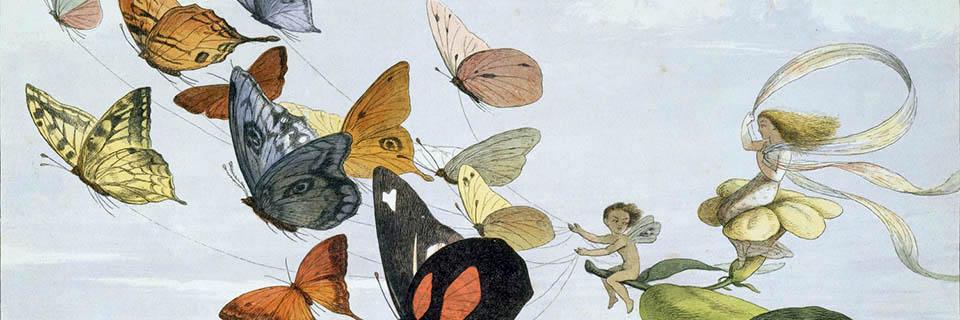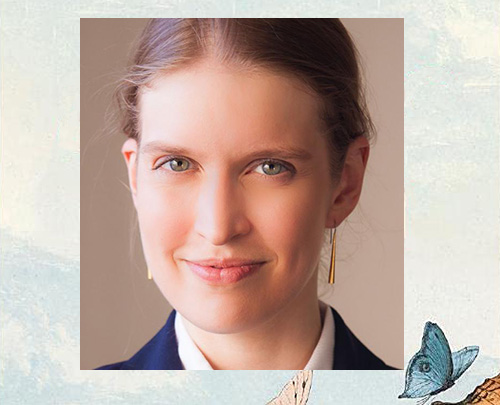No Small Matter: English Professor Finishes 11-year Journey to Write First Book

As a young girl, Laura Forsberg’s father read her Jane Austen’s “Pride and Prejudice,” thoroughly explaining the minutia of the era’s manners and etiquette. Her world of wonder was magnified through literature and now the Rockhurst Associate Professor of English, author, and new mom is providing a similar opportunity to others through her first book, published through the prestigious Yale University Press.
“Worlds Beyond: Miniatures and Victorian Fiction,” which examines how Victorians imagined miniature worlds beyond perception, hit stores, libraries, and collections in 2021, the result of an 11-year process Forsberg started as a Ph.D. student at Harvard University.
Among the reasons Forsberg first became interested in miniatures was because it occurred to her that many times when women were spoken of, it was with diminutive language.
“I started to wonder, ‘Is that always disempowering? Is that always something that means that you are peripheral and secondary, or could there be some sort of alternative flip side to it?’”
Forsberg found that there seemed to be an expansiveness associated with miniatures.
“If women were associated with the miniature, it seems to be finding a way to say this is very small, but it actually opens up a whole other world,” she said.

As a practical example, Forsberg writes about microscopes, as they became affordable and popular in society during the 19th century.
“If you look at something like a water trap, you don't see anything that's there,” she said.
“You look at it through the microscope, and suddenly you realize that it's a swarming field of active life. So, this smallness allows a sort of liberation.”
This liberation extends to miniature books painstakingly made by hand during the era, something she began to appreciate at Harvard.
“Harvard has a collection of six of the Brontës’ juvenile manuscripts,” she said. “They're about an inch and half to two-inch-tall manuscripts that the Brontës crafted when they were young children. When Charlotte's 12 years old, she starts writing in this tiny, tiny script, and she starts rewriting a sort of version of the Napoleonic Wars and writing about epic struggles in West Africa. With these romances and soldiers waging wars across the plains (she and her brother drew maps of this area) they're really imagining an entire world on a scale that is sized to match her brother's toy soldiers. And I thought, ‘Okay, this sort of clinches that the miniature is real.’
“And I think we see that happen in her later writings and something like ‘Jane Eyre,’ which is about the claustrophobic world of governesses,” Forsberg continued. “You get these little hints where Jane Eyre looks at the horizon and she thinks just beyond that horizon, ‘There's something more just for me.’”
Forsberg, a graduate of Princeton (B.A. English) and Harvard (M.A. English, Ph.D. English), began this project as her dissertation in 2010. She finished her dissertation in 2016 and was awarded a National Endowment for the Humanities Fellowship at the Huntington Library, Art Museum, and Botanical Gardens educational and research institution in San Marino, California.
“It’s an incredible honor to hold a year-long fellowship at the Huntington,” she said. “It allowed me to work with people who are working on their fourth or fifth book manuscripts and, and they helped me figure out how exactly do I reshape this? How exactly do I present this to publishers?”
Utilizing her colleagues’ advice, Forsberg redrafted her manuscript and reached out to Yale at the end of the year, ultimately agreeing to a contract just as she arrived at Rockhurst in 2017.
“I think having Yale University Press publish the book automatically gives it gives it authority,” she said. “It automatically indicates that this is the sort of book that could really have a far-ranging impact. This isn't just a work of literary criticism, it’s also cultural history, and allows individuals to reconceive their place in the world.”
Forsberg hopes readers, including her students, come to the realization that sometimes the greatest transformations happen through the smallest objects.
“Sometimes those smallest things end up being the most deeply and most inwardly transformational, because they radically allow you to revise your point of view so that in a world where we're always thinking bigger, better, more, instead you could think about the ways in which a single voice, a tiny thing could allow a radically different way to conceive of the world.
“And that's something I take with me in my encounters with Rockhurst students,” she continued. “I might have a huge purpose for a course, but it might be one tiny moment that we have together that really ends up lingering with that student and ends up changing them. Or it might be the one paper they write or the one English class that they take that ends up shifting their point of view. So small matters in an age when we are always hearing that what matters is the biggest, loudest, and most adamant.”
Forsberg believes Rockhurst provides a unique learning environment in which those small interactions with students can have big, lasting impacts on their future.
“I am really astonished by the fact that professors and students get to have these really close relationships, that Rockhurst really believes in Cura Personalis. I think the really transformative learning experiences take place in an environment where we care about each other at a really genuine level and where students aren't just learning about texts – they're learning about how those might speak to them and to their experiences,” she continued. “And that's really what I love about Rockhurst.”







